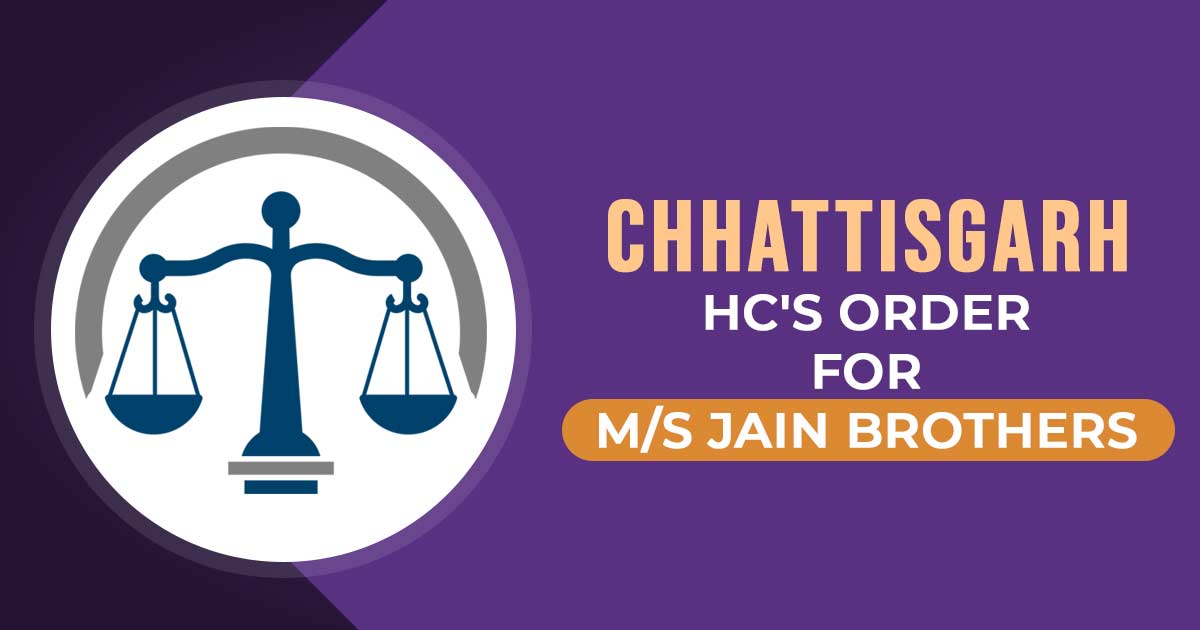
The constitutional validity of Section 16(4) of the CGST Act is been upheld by the Chhattisgarh High Court which states the time duration where a registered assessee is needed to claim the ITC.
Justice Sanjay K. Agrawal and Justice Radhakishan Agrawal’s bench noted that Section 16(4) of the CGST Act doesn’t contravene Articles 14, 19(1)(g), or 300A of the Constitution. However, as the petitioner isn’t a citizen, they clarified that the petitioner cannot claim rights under Article 19(1)(g).
The petitioner, a proprietorship firm involved in the trade of oils and related products, consistently procures goods and utilizes specific services for its business needs. Being a registered entity under the designated GST Acts, it is obligated to submit its monthly return using Form GSTR-3B under Section 39 of the CGST Act, following Rule 61 of the Central Goods and Services Tax Rules, 2017.
In the fiscal year 2018-19, the petitioner submitted a return for March 2019 under Section 39 of the CGST Act using Form GSTR-3B on November 13, 2019. This return specifically pertained to that period, inclusive of late fees paid as per Section 47 of the CGST Act for March 2019 in the April 2019 Form GSTR-3B. Additionally, interest under Section 50 was remitted in the return for the same period. The Input Tax Credit (ITC) claimed in the March 2019 return was eligible for that specified period under Section 16(2).
The respondent or department issued a demand letter to the petitioner, seeking payment based on an allegation of wrongfully availed input tax credit (ITC) under Section 16(4) of the CGST Act, coupled with interest under Section 50 of the same Act.
Challenging this, the petitioner raised concerns about the constitutional validity of Section 16(4) of the CGST Act and the ongoing recovery proceedings for Rs. 9,43,920, along with interest and penalties. The argument posited that the recovery under Section 16(4) violates Articles 14, 19(1)(g), and 300A of the Constitution.
The petitioner argued that Section 16(4) holds a procedural nature and should not supersede the substantive conditions outlined in Sections 16(1) and 16(2).
The department argued that Section 16(4) of the CGST Act stands as a constitutionally sound provision and an integral part of the statute. Consequently, the conditions outlined in Section 16(4) regarding the eligibility for Input Tax Credit (ITC) are binding upon taxpayers.
According to the department, Section 16(4) does not breach Article 14, Article 19(1)(g), or Article 300A of the Constitution. They also asserted that the writ petition, being premature, should be dismissed.
The court ruled that the petitioner hasn’t substantiated grounds to challenge the constitutional validity of Section 16(4) of the CGST Act, acknowledging it as legally valid legislation.
| Case Title | M/s Jain Brothers Vs. Union of India |
| Citation | Writ Petition (T) No.191 of 2022 |
| Date | 11-12-2023 |
| For Petitioner | Mr. Palash Soni, Advocate, through Video Conferencing |
| For Respondent No.1 / Union of India | Mr. Ramakant Mishra, Deputy Solicitor General of India and Ms. Anmol Sharma, Advocate |
| For Respondent No.2 / State | Mr. Amrito Das, Additional Advocate General |
| For Respondents No.3 to 5 | Mr. Ashutosh Singh Kachhawaha and Ms. Shruti Pramar, Advocates |
| Chhattisgarh High Court | Read Order |